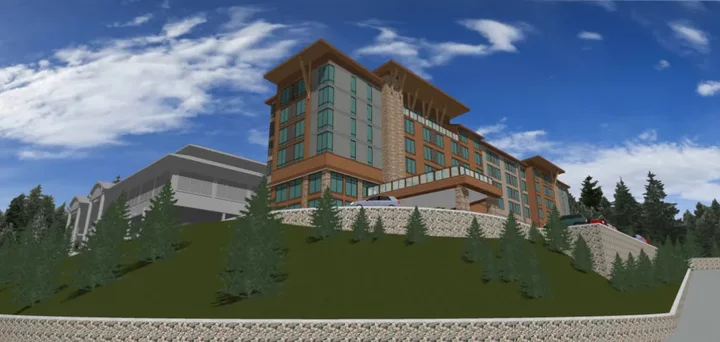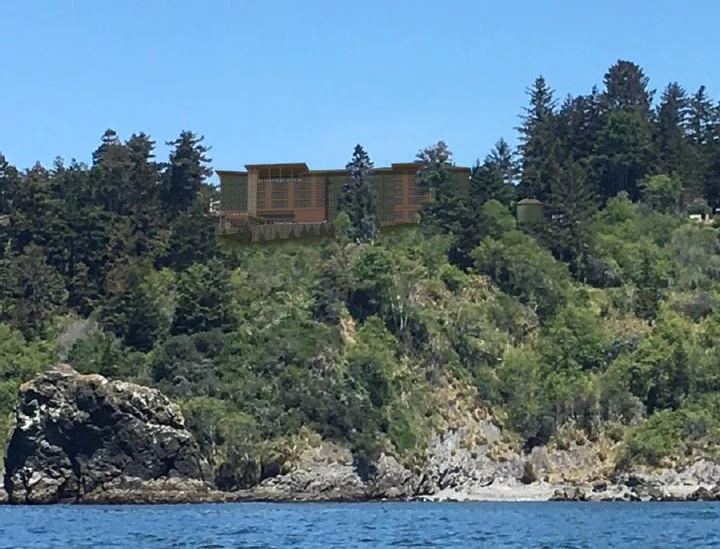Rendering of a proposed five-story, 100-room Hyatt hotel proposed on the bluff adjacent to the Cher-Ae Heights Casino, overlooking the Pacific. | Image via California Coastal Commission.
###
Long-gestating plans from the Trinidad Rancheria to build a five-story, 100-room Hyatt hotel on the bluff above Scenic Drive were dealt a blow yesterday by a California appeals court’s tentative ruling, which says there’s insufficient evidence that the hotel would have adequate fire protection services.
If the tentative ruling is finalized it would reverse a conditional determination made by the California Coastal Commission way back in August 2019. With a narrow 6-5 vote, the commission agreed with the federal Bureau of Indian Affairs (BIA), which had found the project consistent with the state’s Coastal Act. However, the Coastal Commission said the Tribe would need to find an adequate water supply, which had proved difficult for the Tribe.
With yesterday’s tentative ruling, Justice Mark B. Simons, of California’s 1st District Court of Appeal, scheduled oral arguments for Nov. 21. If the Coastal Commission or any other parties, including the Trinidad Rancheria, want to make a case against this preliminary opinion, they’ll be given 10 minutes apiece to do on that date.
The appeal of the Coastal Commission’s 2019 decision was filed by the Humboldt Alliance for Responsible Planning (HARP), a nonprofit group focused on development issues in the Trinidad-Westhaven area. A trial court denied HARP’s petition, but the group appealed on five separate grounds, challenging the reasoning and foundations of the commission’s actions on a variety of matters, including the look of the hotel — whether it would fit in with its scenic surroundings.
A visual simulation of the proposed hotel at the Trinidad Rancheria from the water below. | Image via California Coastal Commission.
Justice Simons rejects all but one of those arguments in his tentative opinion — the one saying there’s no substantial evidence to support a finding of adequate fire protection services for the proposed hotel.
“[W]e agree with HARP that there is insufficient evidence to support that finding,” Justice Simons says.
During the 2019 hearing, Coastal Commission staff pointed to cooperative agreements with surrounding fire service providers, including the Trinidad and Westhaven volunteer fire departments and CalFire, which has a station nearby. But staff also noted that the closest hook and ladder equipment was in Arcata.
The services closer to the proposed hotel, including those from the nearby CalFire station, are equipped to handle residential fires but not blazes in a multi-story hotel.
Rancheria CEO Jacque Hostler-Carmesin “acknowledged that the closest ladder truck was in Arcata,” Simons notes, but she then pushed back on the commission — and on local Commissioner Mike Wilson, in particular — arguing that the commission was “really questioning the tribe’s integrity.”
Hostler-Carmesin added, “for insurance reasons, we have fire hydrants, we have fire protection … we do everything right … and the building will have sprinkler systems, all of that.”
Wilson and the rest of the commission backed off, but Simons observes that, “The revised findings made no mention of fire protection services.” His tentative ruling says that because HARP raised its concerns in a timely manner “and because the adequacy of fire protection services is an important public safety issue, we exercise our discretion to consider it here.”
Ultimately, his tentative ruling comes down to a sort of technicality. He says that the commission’s finding that there are adequate fire protection services is reasonable, “But we further conclude that there is insufficient evidence to support that finding.”
Simons notes that the Tribe only said it has “preliminary agreements, verbally with CalFire” but also acknowledged that “[w]e haven’t circled back to CalFire.”
“Although we do not doubt the sincerity of the Tribe’s representations or intentions, this vague assertion of a preliminary, verbal agreement with CalFire simply does not constitute substantial evidence of adequate fire protection services,” Simons writes.
The Outpost reached out to HARP, the Coastal Commission and the Trinidad Rancheria earlier today. A member of HARP did not respond to our email before this post was published.
Reached by phone, Hostler-Carmesin said she had no idea that anything like this had been filed in court. She declined to comment any further on the record, saying she’ll send us an official statement in the near future.
The Coastal Commission did not immediately provide responses to an emailed list of questions, though spokesperson Joshua Smith said he’ll try to get replies by early next week.
We will report more on this issue once we hear back from the above-mentioned folks.
###
###
PREVIOUSLY
- Take a Look at the Big Proposed Trinidad Casino Hotel; Concerned Community Members Schedule Meeting to Gin Up Public Comment
- Coastal Commission Gives Green Light to 100-Room Hotel on Trinidad Rancheria … as Long as the Tribe Can Find a Reliable Water Supply
- That Coastal Commission Meeting Was a Confusing Mess. Did They Even Mean to Advance the Hotel Project?
- The City of Trinidad and the Trinidad Rancheria Are at Odds Again Over the Water Supply for the Tribe’s Hotel Project
- City Pumps Brakes on Trinidad Rancheria’s Request for Water; Will Draft Policy Before Continuing Formal Negotiations Over New Hotel Development
- Trinidad Rancheria Asks for Pipeline Extension to Get Water Via Humboldt Bay Municipal Water District


CLICK TO MANAGE